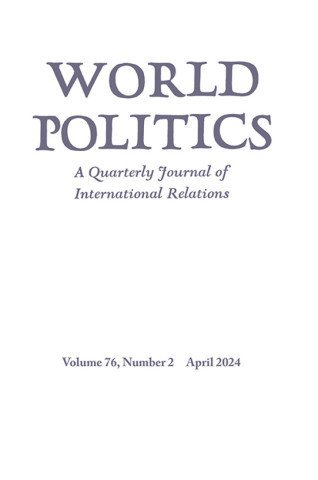The Uneven State: Center and Periphery in Shaping State Capacity in Thailand
IF 2.5
1区 社会学
Q1 INTERNATIONAL RELATIONS
引用次数: 0
Abstract
abstract: This article examines the state's uneven capacity to deliver public social goods to the periphery. It does so through a comparative analysis of two agencies in Thailand, the Ministry of Public Health and the Ministry of Education, which have exhibited a marked disparity in serving rural citizens over the past twenty-five years. The author traces these outcomes to a divergence in how the agencies perceive the significance of their rural policies in meeting Thailand's security threats and economic growth strategy. This perception produces contrasting organizational norms between central and local bureaucrats, which informs incentives for capacity-building. When an agency's central office believes that rural policy matters significantly for national goals, norms develop that encourage local agents to invest in serving rural needs. But when an agency deems rural policy to be less urgent in meeting key national objectives, the converse ensues. The article finds that how an agency strategically considers the rural sector influences its decisions to invest in the periphery, with lasting consequences for state capacity and the rural-urban divide.不均衡的国家:塑造泰国国家能力的中心与边缘
摘要:本文探讨了国家向边缘地区提供社会公共产品的不均衡能力。文章通过对泰国公共卫生部和教育部这两个机构进行比较分析,发现这两个机构在过去二十五年中为农村居民提供服务的能力存在明显差异。作者将这些结果归因于这两个机构对其农村政策在应对泰国安全威胁和经济增长战略中的重要性的不同认识。这种认识在中央和地方官员之间产生了截然不同的组织规范,从而影响了能力建设的动力。当一个机构的中央办公室认为农村政策对实现国家目标具有重要意义时,就会形成一种规范,鼓励地方官员在满足农村需求方面进行投资。但是,当一个机构认为农村政策在实现关键国家目标方面的紧迫性较低时,情况就会相反。文章发现,一个机构如何从战略角度考虑农村部门,会影响其投资周边地区的决定,从而对国家能力和城乡差别产生持久影响。
本文章由计算机程序翻译,如有差异,请以英文原文为准。
求助全文
约1分钟内获得全文
求助全文
来源期刊

World Politics
Multiple-
CiteScore
8.40
自引率
0.00%
发文量
24
期刊介绍:
World Politics, founded in 1948, is an internationally renowned quarterly journal of political science published in both print and online versions. Open to contributions by scholars, World Politics invites submission of research articles that make theoretical and empirical contributions to the literature, review articles, and research notes bearing on problems in international relations and comparative politics. The journal does not publish articles on current affairs, policy pieces, or narratives of a journalistic nature. Articles submitted for consideration are unsolicited, except for review articles, which are usually commissioned. Published for the Princeton Institute for International and Regional Affairs
 求助内容:
求助内容: 应助结果提醒方式:
应助结果提醒方式:


